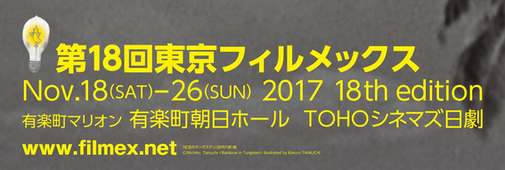News and Opinion
TOKYO FILMeX 2017 and the Independent Cinema Guild

Fall is the main film festival season in Japan (see my reports on this year's YIDFF and TIFF editions here, here, and here), but not all festivals are the same. Yamagata, of course, focuses on documentary (though the definition of documentary is flexible enough to allow for a wide variety of films), and the Tokyo Film Festival aims at being the Japanese edition of Cannes.
TIFF doesn’t succeed at that, which is why festivals such as Tokyo Filmex have stepped in to fill some of the gaps. Filmex is much smaller in comparison to TIFF, but it purposely avoids the big commercial films that TIFF is happy to show, concentrating instead on mostly independent films. Asia is largely the focus, and only a choice few Japanese films get shown. One exception has been the retrospective section. If the Tokyo Film Festival has largely abandoned the role a major festival has in celebrating the history of cinema, by eliminating or stripping down its retrospective sidebar, Filmex took it over and did wonderful series on lesser known masters such as Uchida Tomu, Okamoto Kihachi, and Kawashima Yuzo (I penned a piece on Kawashima for their catalog). In recent years, it has even started Tokyo Talents, which aims to help young Asian filmmakers develop their projects; the International Critics Forum, a workshop for budding film critics; as well as seminars in translation and other aspects of film.
Tokyo International Film Festival 2017: Japanese Films

In my last report (a little bit too long ago), I talked about my experience serving on the ratings panel at the 2017 Tokyo International Film Festival for the Asahi newspaper. Because I had to watch all fifteen Competition films I had much less time to view new Japanese movies than I hoped. Nevertheless, I did catch a number of interesting films, although the average level of the Japanese product I saw was disappointingly not that high.
First, there were two Japanese films in the Competition: Zeze Takahisa’s The Lowlife and Ooku Akiko’s Tremble All You Want, both of which produced complex but quite different reactions in me. With a background in pink film, Zeze was in some ways returning to familiar territory with a film about the AV porn industry, but The Lowlife focused on the actresses, having been based on AV actress Mana Sakura’s novel. Its boldest, yet clearly most controversial challenge, was the decision not to pursue the question of why these women appear in AV. I could agree with that, since the question itself is problematic, since it frequently revolves around social prejudices against sexuality that are not equally applied to men: people will obsess over why a woman appears in AV, but not over why a man does. Zeze instead focuses on the relationships of the women, with delicate portrayals that in the end emphasize female connections in the family. I ultimately liked the film, though some colleagues hated it and considered it no better than an AV film. I instead thought it consciously deviated from both AV and pink, in terms of narrative (the only spontaneous off-set sex in the film is a failure) and camera style (using shallow focus against the pan focus of AV), but I did recognize that with at least one woman (the older married woman Ayako), there was the danger that the hinted motivations hewed a bit too closely to the MILF genre in porn.

